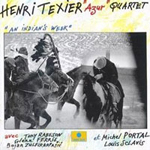This review page is supported in part by the sponsors whose ad banners are displayed below |
 |
 |
|
 |
For a few weeks I ran the 8200CDQ as bog-standard spinner in lieu of my usual transport/DAC duet from Heed without running any comparisons. I didn’t miss a thing. I could easily live with the Audiolab. "Closer" from the Finally Woken CD by Wales singer Jem shall stand in as example. It’s a pretty clever production which multi-tracks the vocalist to obscure her lack of range (she’s no power belter). The Audiolab placed this layering in high relief. This number—it’s about sex—otherwise alternates between uptempo and slower intervals with finely behind-the-beat synth accents, potently disruptive rock guitar and a properly grounded forward-mixed bass line. The Audiolab portrayed the mesh of seriousness and humor I love about this piece. The bass pulsed, the guitar dynamically decoupled very effectively from the rest. With this player "Closer” was fun and meaningful where lesser players can render it somewhat empty.
|
| |
|
|
A good test for any CD player is piano fare. For that I fancy the transcription of Lieutenant Kijé which Frédéric Chiu recorded for Harmonia Mundi. Here the piano is relatively close mike’d with at least two microphones but the hall sound remains intelligible. The Audiolab was very precise with the attacks. The three phases of transient, sustain and release were treated equally without preference. I did think that dynamic transient contrast came off somewhat better from the midrange on up than below into the bass. Writing this I wondered what the optimal transient DD filter’s effects might have been on this number but the player had already been dispatched to Berlin for photography.
|
|
|
|
|
|
|
| The core trait of this machine which subsequent investigation didn’t overwrite was one of good bandwidth and soundstaging, without obvious deviations from linearity but perhaps somewhat lighter mids and bass than other players to instead favor clarity and transparency, with resolution that was clearly a few cuts above its price class but still suitable for long-term comfort.
For context as Redbook player I ran the Audiolab against the more than twice-priced Heed Obelisk combo. The latter was overall more cohesive, mature and full. |
|
|
Its tonal balance was a bit darker and to my ears more natural. With Jem’s cut the dynamic window opened a bit further, the guitar was more incisive, the bass weightier, the voice more seductive. With the piano transcription left and right hand were better matched, rhythmic finesse was higher. Even so the Audiolab soundstaged more generously and clearly deeper. The Heed combo isn’t merely tonally but also dimensionally darker. The 8200CDQ also better trailed the string decays but these differences were minor. I did already say that quality digital sources these days show smaller margins of difference than other categories? As a transitional conclusion the Audiolab was clearly worth its sticker as a CD player. How about as converter?
|
|
|
|
 |
I now compared the Audiolab solo against leashing it to the Heed transport. The first session saw the Audiolab as CD player victorious by a very clear lead. Substituting a better digital cable (so much for 1s and 0s being blasé about cables) drastically shrunk this lead to leave little to differentiate. Rather than absolutes these now were minor tendencies. Augmented by the Heed spinner the Audiolab was a bit more substantial and dynamic contrast seemed higher for example on the piano album. On the other hand the upper treble (say the cymbal on the Henri Texier Azur Quartet’s An Indian’s Week) was fractionally better resolved by the Audiolab pure. That was about it for anything newsworthy on that count. |
|
The Texier CD remained on hand for a comparison of Audiolab disc spinning vs. computer streaming where a friend’s MacBook with M2Tech hiFace facilitated the latter. Apple’s iTunes was tweaked with PureMusic in memory mode to play from RAM buffer rather than spinning hard disk. Though PM enables its own upsampling I had to defeat it because the Audiolab coax input otherwise didn’t manage signal lock despite its claimed 24/96 compatibility. This followed the owner’s manual advice about feeding a digital signal sans prior DSP processing or resampling to allow the 8200CDQ’s own upsampler the best of work conditions.
|
The Henri Texier ‘Azur’ Quartet was spun off the team of Michel Portal and Louis Sclavis who guest star on An Indian’s Week. The track "Mâshala" is probably my favorite here and the Audiolab applied excellent fluidity. Once I compared the internal transport to the external computer feed, the former suddenly sounded smaller, greyer, less shiny and differentiated. Something very similar occurred on "One Meat Ball" by the recently deceased Texan singer/guitarist Calvin Russell. His live CD Crossroad sports voice, guitar and audience exclusively. Via the Mac the guitar gained in size, hand taps on the guitar body contained more wood, audience applause was better resolved and the vocals had more chestiness.
|
|
|
|
 |
|
 |